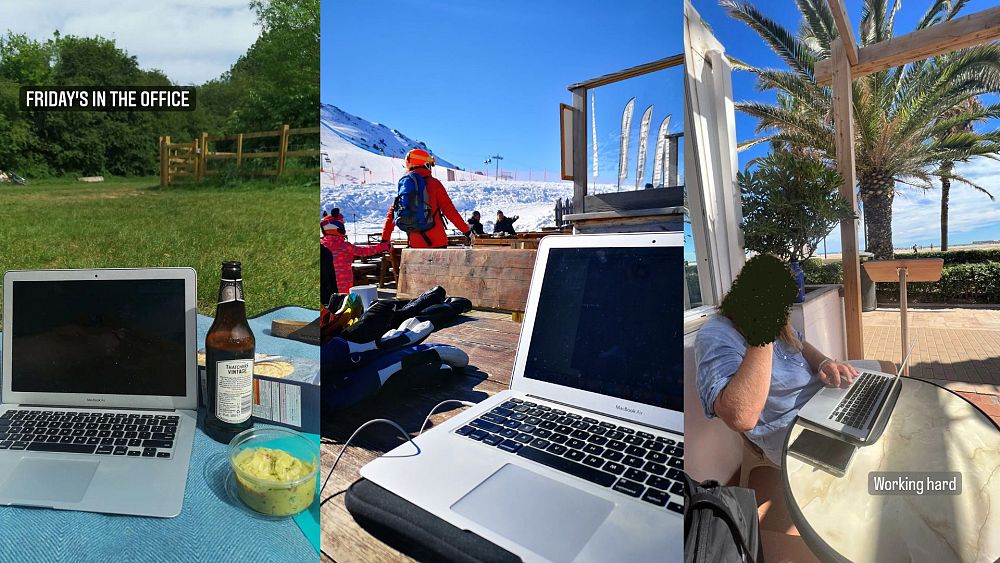It’s a Monday morning and Connor is writing emails to a client. Only he’s not sitting behind a desk, but at a mountain bar, beer in hand, overlooking snowy ski slopes.
He could be a digital nomad or a remote worker, apart from the fact that he is an employee whose boss has no idea he’s there.
Connor is on what has now been dubbed a ‘hush trip’ - a secret working holiday unauthorised by employers.
The practice is gaining popularity as employees with inflexible contracts see the attraction of working from more exotic surroundings - and tagging on a few holiday days.
Here’s how one consultant has been getting away with it for years.
What are hush trips and why are they so appealing?
Connor has been taking undisclosed trips abroad for five years, since before the pandemic. But the remote working policies imposed during lockdown were a boon.
As an employee of a consulting firm in London, he can’t take advantage of digital nomad visas or working abroad schemes.
And because of tax complications, he can’t legally work more than a certain number of days in another country.
As Connor only works two days in the office - generally Wednesday and Thursday - he’s devised ways to shoehorn in as much holiday time as possible.
“I fly out somewhere on Thursday night and remote work on Friday,” he says, “which means as soon as it hits 5pm I’m out the door and straight to dinner or a bar.”
It’s also a potential solution for workers on contracts that are ungenerous with vacation days. Once you switch off the computer, you can get straight into holiday activities.
“It’s much better than having to navigate an airport on Friday evening and arriving at midnight,” says Connor.
What is it like to take a hush trip?
It’s hard to imagine workers are especially productive on a hush trip, but Connor likens it to the four-day week.
“If you set a limited time to do your work and cut out the distractions you might have in the office, you’re generally more motivated to get things done.”
He’s spent weekends sightseeing in Amsterdam, relaxing on beaches or skiing in the Dolomites.
Although it sounds idyllic, it’s not without stress and requires skilled management.
“I try to cram my meetings together in a solid block so I have more flexibility to do other activities,” Connor says.
But if you are asked to jump on a call unexpectedly, it can be a problem.
“I’ve had to mute microphones to cut out train announcements and one time I had to run back from the beach to join a meeting,” he says.
What you need to know if you want to take a hush trip
There are a few logistical challenges to work out before you try taking a hush trip.
In order to disguise your location, Connor recommends buying a VPN (which hides a user’s IP address) to give the impression you are still at home.
Connor also warns not to get caught out by social media. “I posted a photo of a sunset in Madeira while the UK was in lockdown and one of the partners saw,” he says. The incident led to a run-in with HR.
Now, he makes sure only select friends can see his content while he’s away and adopts a “don’t ask, don’t tell” policy.
Choosing places with the same or similar time zone to your working country is also helpful.
“Madeira was definitely the best trip, hands down,” says Connor. “It’s the same time zone as the UK plus it’s warm, sunny and the food’s great.”
The problems with hush trips
The most serious issues with working secretly abroad relate to your tax situation. Depending on the country, there can be unexpected legal implications if you work from there for a long period.
It could mean the country you are remotely working in will seek tax for the income you are receiving, while you continue to be taxed in your home country.
If you are not an EU citizen, you also have to ensure you are not overstaying your 90 days in the bloc - “I keep a log of my trips so I don’t get caught out,” says Connor.
And if your clandestine trips do get out, it could result in a breakdown of trust between you and your employer.
Connor advises being efficient, completely on top of work loads and essentially indispensable so that your boss can’t accuse you of shoddy work.
“Hopefully that means the most you’ll get is a slap on the wrist and be told to stop doing it,” he says.
But whether bosses like it or not, the rising popularity of hush trips should be a clear message to employers that time to disconnect and refresh is becoming a priority for workers.


